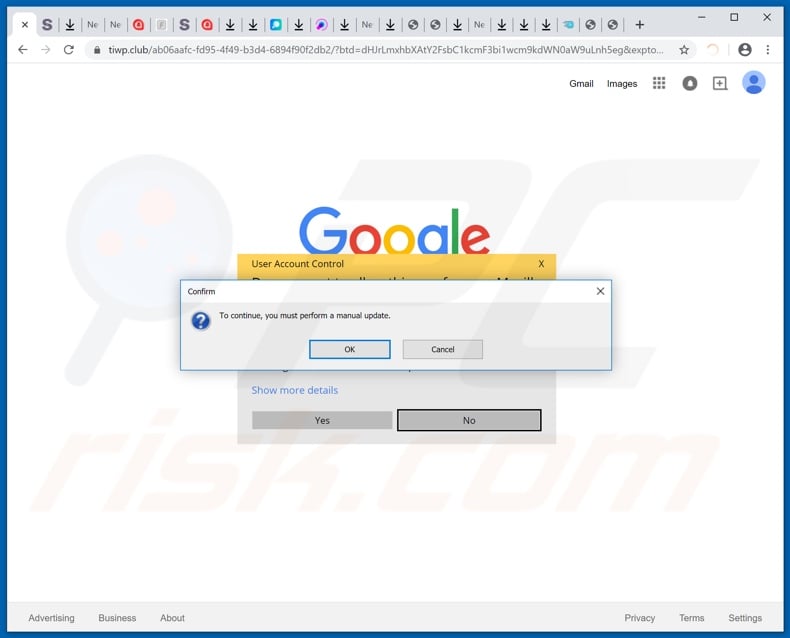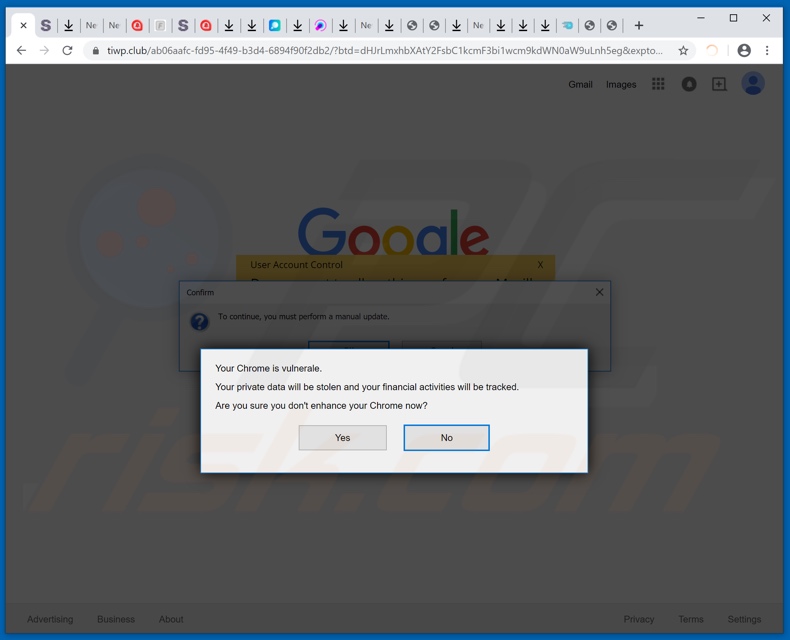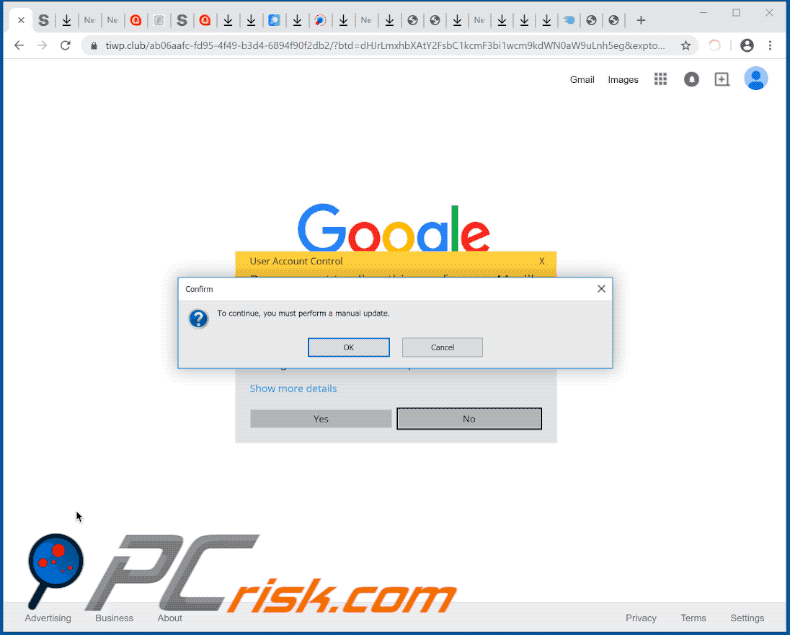Do not trust the "To continue, you must perform a manual update" scam
Phishing/ScamAlso Known As: To continue, you must perform a manual update pop-up
Get free scan and check if your device is infected.
Remove it nowTo use full-featured product, you have to purchase a license for Combo Cleaner. Seven days free trial available. Combo Cleaner is owned and operated by RCS LT, the parent company of PCRisk.com.
What is the "To continue, you must perform a manual update" scam?
"To continue, you must perform a manual update" is a scam run on deceptive websites. It claims that users' browsers lack unspecified updates and have become vulnerable. This scheme proliferates through Potentially Unwanted Applications (PUAs) such as adware.
Few visitors to scam sites access them intentionally - most are redirected to them by intrusive advertisements or PUAs already infiltrated into the system.

When a web page promoting this scam is accessed, it displays several pop-up windows. The first states that, to continue, users must perform a manual update. The second elaborates that users' Google Chrome browsers have become vulnerable, and that their online financial activity and other private data can be tracked.
The pop-up asks whether they wish to update their browsers. If users click any of the consent buttons, they are redirected to promotional web pages of PUAs. For example, adware, browser hijackers and so on.
All claims made by this scheme are false, and trusting it will not update the browser - users will unintentionally allow nonoperational, untrusted or even malicious software onto their browsers/systems.
PUAs can force-open deceptive/scam websites and also cause redirects to untrusted/rogue, sale-oriented, compromised and malicious pages, however, these apps also have additional capabilities. Some types (i.e., adware) can enable the placement of pop-ups, banners, coupons and other intrusive advertisements on any visited site.
These ads diminish the browsing experience and, once clicked, redirect to similarly harmful sites and can even execute scripts to stealthily download/install rogue content (e.g. PUAs). Other unwanted applications (such as browser hijackers) modify browsers to promote fake search engines.
They reassign the homepage, default search engine and new tab/window URLs to the addresses of bogus web search engines. Therefore, each search query typed into the URL bar and new browser tab/window opened redirects to the promoted address.
Fake search engines are typically unable to provide unique results, and so they redirect to Google, Yahoo, Bing and other legitimate sites. Furthermore, most PUAs (adware and browser hijackers included) monitor browsing activity and collect personal information extracted from it (IP addresses, geolocations and other details).
The collected data is often monetized by sharing with third parties (potentially, cyber criminals) seeking to misuse it for profit.
To summarize, the presence of unwanted apps on devices can lead to system infections, serious privacy issues, financial loss and even identity theft. To protect device and user safety, remove all suspicious applications and browser extensions/plug-ins without delay.
| Name | To continue, you must perform a manual update pop-up |
| Threat Type | Phishing, Scam, Social Engineering, Fraud. |
| Fake Claim | Scam claims users' browsers are vulnerable and require an unspecified update. |
| Distributed Unwanted Apps | Scam promotes various unwanted applications. |
| Related Domains | tiwp[.]club, opengreatlyprecisefreeware[.]icu |
| Symptoms | Fake error messages, fake system warnings, pop-up errors, hoax computer scan. |
| Distribution methods | Compromised websites, rogue online pop-up ads, potentially unwanted applications. |
| Damage | Loss of sensitive private information, monetary loss, identity theft, possible malware infections. |
| Malware Removal (Windows) |
To eliminate possible malware infections, scan your computer with legitimate antivirus software. Our security researchers recommend using Combo Cleaner. Download Combo CleanerTo use full-featured product, you have to purchase a license for Combo Cleaner. 7 days free trial available. Combo Cleaner is owned and operated by RCS LT, the parent company of PCRisk.com. |
There are countless deceptive websites on the web and they use various scam models to trick people.
Popular models include (but are not limited to) alerts that the device is infected and/or at risk (e.g. "System Warning Alert", "Activation Security Warning", etc.), "amazing" deals and offers (e.g. "Get the new iPhone 11 Pro", "Randomly selected to test the new iPhone", etc.), and prize giveaways (e.g. "International Official Lottery", "2020 Web Research Survey", etc.).
These schemes encourage users into: downloading/installing and/or purchasing nonoperational, untrusted or malicious software; revealing personal information (e.g. names, addresses, telephone numbers, emails, banking account or credit card details, etc.); making monetary transactions (e.g. paying fake fees, bills, etc.); calling fraudulent and expensive support or service lines; logging-in to accounts via fake web pages, and so on.
Regardless of what these pages claim, request or demand, their purpose is identical: to generate revenue for their designers.
How did potentially unwanted applications install on my computer?
Some PUAs have "official" download sites, which are commonly promoted by deceptive/scam sites. These applications are also proliferated via the download/installation set-ups of other software. This deceptive marketing method of pre-packing regular products with unwanted or malicious additions is called "bundling".
Rushing download/installation processes (e.g. ignoring terms, skipping steps, using pre-set options, etc.) increases the risk of unintentionally allowing bundled content onto the system. When clicked, intrusive advertisements can execute scripts to download/install PUAs without users' consent.
How to avoid installation of potentially unwanted applications
You are advised to research all software before download/installation or purchase. All downloads must be made from official and verified sources. Unofficial and free file-hosting websites, Peer-to-Peer sharing networks (BitTorrent, eMule, Gnutella, etc.) and other third party downloaders are untrusted, since they can offer deceptive and/or bundled content.
Treat download and installation processes with caution. Read the terms, study all available options, use the "Custom/Advanced" settings and decline offers of supplementary apps, tools and other additions. Intrusive ads usually seem normal and harmless, however, they can redirect to highly dubious web pages (e.g. gambling, adult-dating, pornography, etc.).
If you encounter ads/redirects of this kind, inspect the system and immediately eliminate all suspect applications and browser extensions/plug-ins. If your computer is already infected with PUAs, we recommend running a scan with Combo Cleaner Antivirus for Windows to automatically eliminate them.
Text presented in the first "To continue, you must perform a manual update" scam pop-up window:
Confirm
To continue, you must perform a manual update.
[OK] [Cancel]
Screenshot of the second pop-up window:

Text presented in this pop-up:
Your Chrome is vulnerale.
Your private data will be stolen and your financial activities will be tracked.
Are you sure you don't enhance your Chrome now?
[Yes] [No]
The appearance of "To continue, you must perform a manual update" pop-up scam (GIF):

Instant automatic malware removal:
Manual threat removal might be a lengthy and complicated process that requires advanced IT skills. Combo Cleaner is a professional automatic malware removal tool that is recommended to get rid of malware. Download it by clicking the button below:
DOWNLOAD Combo CleanerBy downloading any software listed on this website you agree to our Privacy Policy and Terms of Use. To use full-featured product, you have to purchase a license for Combo Cleaner. 7 days free trial available. Combo Cleaner is owned and operated by RCS LT, the parent company of PCRisk.com.
Quick menu:
- What is To continue, you must perform a manual update pop-up?
- How to identify a pop-up scam?
- How do pop-up scams work?
- How to remove fake pop-ups?
- How to prevent fake pop-ups?
- What to do if you fell for a pop-up scam?
How to identify a pop-up scam?
Pop-up windows with various fake messages are a common type of lures cybercriminals use. They collect sensitive personal data, trick Internet users into calling fake tech support numbers, subscribe to useless online services, invest in shady cryptocurrency schemes, etc.
While in the majority of cases these pop-ups don't infect users' devices with malware, they can cause direct monetary loss or could result in identity theft.
Cybercriminals strive to create their rogue pop-up windows to look trustworthy, however, scams typically have the following characteristics:
- Spelling mistakes and non-professional images - Closely inspect the information displayed in a pop-up. Spelling mistakes and unprofessional images could be a sign of a scam.
- Sense of urgency - Countdown timer with a couple of minutes on it, asking you to enter your personal information or subscribe to some online service.
- Statements that you won something - If you haven't participated in a lottery, online competition, etc., and you see a pop-up window stating that you won.
- Computer or mobile device scan - A pop-up window that scans your device and informs of detected issues - is undoubtedly a scam; webpages cannot perform such actions.
- Exclusivity - Pop-up windows stating that only you are given secret access to a financial scheme that can quickly make you rich.
Example of a pop-up scam:

How do pop-up scams work?
Cybercriminals and deceptive marketers usually use various advertising networks, search engine poisoning techniques, and shady websites to generate traffic to their pop-ups. Users land on their online lures after clicking on fake download buttons, using a torrent website, or simply clicking on an Internet search engine result.
Based on users' location and device information, they are presented with a scam pop-up. Lures presented in such pop-ups range from get-rich-quick schemes to fake virus scans.
How to remove fake pop-ups?
In most cases, pop-up scams do not infect users' devices with malware. If you encountered a scam pop-up, simply closing it should be enough. In some cases scam, pop-ups may be hard to close; in such cases - close your Internet browser and restart it.
In extremely rare cases, you might need to reset your Internet browser. For this, use our instructions explaining how to reset Internet browser settings.
How to prevent fake pop-ups?
To prevent seeing pop-up scams, you should visit only reputable websites. Torrent, Crack, free online movie streaming, YouTube video download, and other websites of similar reputation commonly redirect Internet users to pop-up scams.
To minimize the risk of encountering pop-up scams, you should keep your Internet browsers up-to-date and use reputable anti-malware application. For this purpose, we recommend Combo Cleaner Antivirus for Windows.
What to do if you fell for a pop-up scam?
This depends on the type of scam that you fell for. Most commonly, pop-up scams try to trick users into sending money, giving away personal information, or giving access to one's device.
- If you sent money to scammers: You should contact your financial institution and explain that you were scammed. If informed promptly, there's a chance to get your money back.
- If you gave away your personal information: You should change your passwords and enable two-factor authentication in all online services that you use. Visit Federal Trade Commission to report identity theft and get personalized recovery steps.
- If you let scammers connect to your device: You should scan your computer with reputable anti-malware (we recommend Combo Cleaner Antivirus for Windows) - cyber criminals could have planted trojans, keyloggers, and other malware, don't use your computer until removing possible threats.
- Help other Internet users: report Internet scams to Federal Trade Commission.
Share:

Tomas Meskauskas
Expert security researcher, professional malware analyst
I am passionate about computer security and technology. I have an experience of over 10 years working in various companies related to computer technical issue solving and Internet security. I have been working as an author and editor for pcrisk.com since 2010. Follow me on Twitter and LinkedIn to stay informed about the latest online security threats.
PCrisk security portal is brought by a company RCS LT.
Joined forces of security researchers help educate computer users about the latest online security threats. More information about the company RCS LT.
Our malware removal guides are free. However, if you want to support us you can send us a donation.
DonatePCrisk security portal is brought by a company RCS LT.
Joined forces of security researchers help educate computer users about the latest online security threats. More information about the company RCS LT.
Our malware removal guides are free. However, if you want to support us you can send us a donation.
Donate
▼ Show Discussion